2时间介词in,on,at的用法
in、on、at关于时间用法
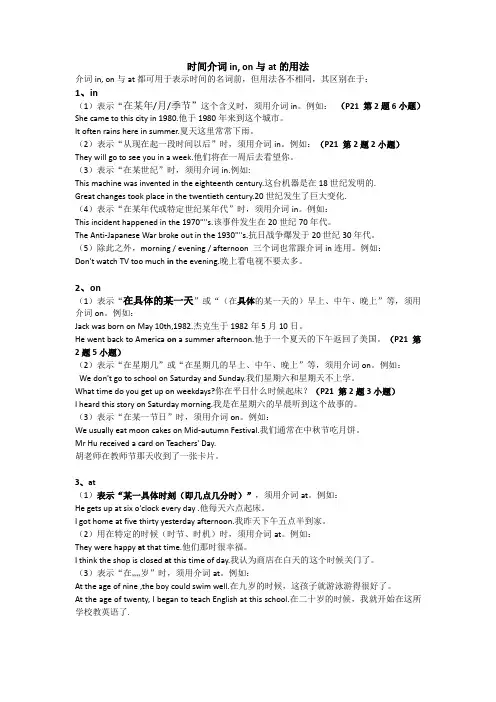
时间介词in, on与at的用法介词in, on与at都可用于表示时间的名词前,但用法各不相同,其区别在于:1、in(1)表示“在某年/月/季节”这个含义时,须用介词in。
例如:(P21 第2题6小题)She came to this city in 1980.他于1980年来到这个城市。
It often rains here in summer.夏天这里常常下雨。
(2)表示“从现在起一段时间以后”时,须用介词in。
例如:(P21 第2题2小题)They will go to see you in a week.他们将在一周后去看望你。
(3)表示“在某世纪”时,须用介词in.例如:This machine was invented in the eighteenth century.这台机器是在18世纪发明的.Great changes took place in the twentieth century.20世纪发生了巨大变化.(4)表示“在某年代或特定世纪某年代”时,须用介词in。
例如:This incident happened in the 1970''''s.该事件发生在20世纪70年代。
The Anti-Japanese War broke out in the 1930''''s.抗日战争爆发于20世纪30年代。
(5)除此之外,morning / evening / afternoon 三个词也常跟介词in连用。
例如:Don't watch TV too much in the evening.晚上看电视不要太多。
2、on(1)表示“在具体的某一天”或“(在具体的某一天的)早上、中午、晚上”等,须用介词on。
例如:Jack was born on May 10th,1982.杰克生于1982年5月10日。
He went back to America on a summer afternoon.他于一个夏天的下午返回了美国。
in on at 时间的用法
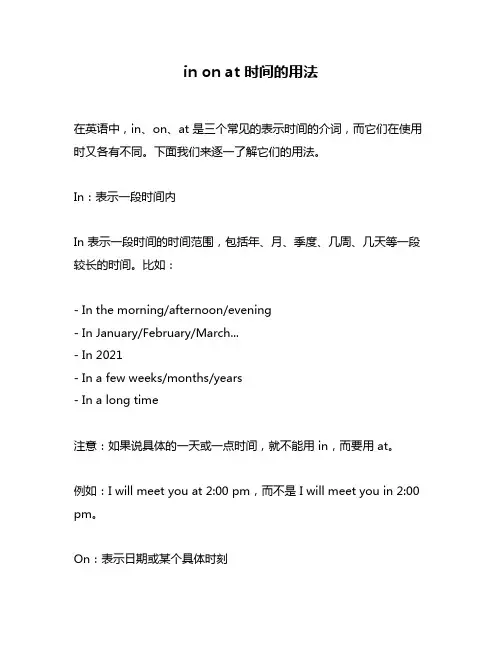
in on at 时间的用法在英语中,in、on、at 是三个常见的表示时间的介词,而它们在使用时又各有不同。
下面我们来逐一了解它们的用法。
In:表示一段时间内In 表示一段时间的时间范围,包括年、月、季度、几周、几天等一段较长的时间。
比如:- In the morning/afternoon/evening- In January/February/March...- In 2021- In a few weeks/months/years- In a long time注意:如果说具体的一天或一点时间,就不能用 in,而要用 at。
例如:I will meet you at 2:00 pm,而不是 I will meet you in 2:00 pm。
On:表示日期或某个具体时刻On 表示一天的某个具体时间点,通常用于特定日期或节日。
比如:- On Monday/Tuesday/Wednesday...- On Christmas Day/New Year's Day...- On my birthday- On time注意:如果说具有一定时长的活动或事件,就不能用 on,而要用 in。
例如:We will meet in June,而不能说 We will meet on June。
At:表示某个时间点或时刻At 表示一个具体的时间点,使用时需要明确具体的小时和分钟。
比如:- At 5 o'clock- At noon/midnight- At the weekend- At present- At this moment注意:如果说一年中的某一时段,就不能用 at,而要用 in。
例如:I always go on vacation in the summer,而不是 I always go on vacation at the summer。
总的来说,in 用于表示(时间)段, on用于表示某个特定的日子或点 in (时间)系, at 用于表示精确时间点。
at,in,on在表示时间时的用法
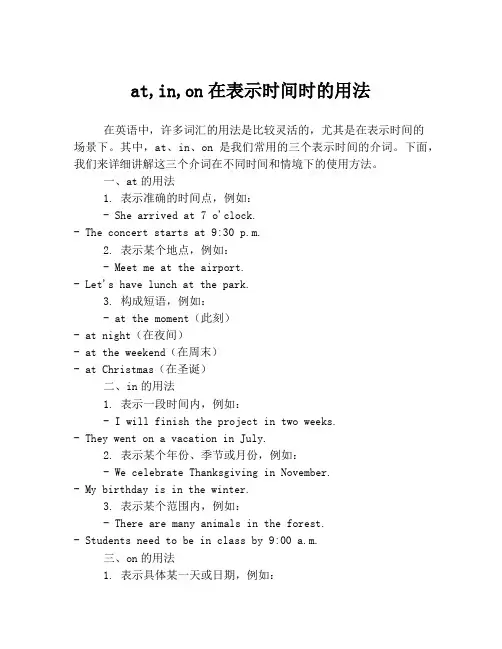
at,in,on在表示时间时的用法在英语中,许多词汇的用法是比较灵活的,尤其是在表示时间的场景下。
其中,at、in、on是我们常用的三个表示时间的介词。
下面,我们来详细讲解这三个介词在不同时间和情境下的使用方法。
一、at的用法1. 表示准确的时间点,例如:- She arrived at 7 o'clock.- The concert starts at 9:30 p.m.2. 表示某个地点,例如:- Meet me at the airport.- Let's have lunch at the park.3. 构成短语,例如:- at the moment(此刻)- at night(在夜间)- at the weekend(在周末)- at Christmas(在圣诞)二、in的用法1. 表示一段时间内,例如:- I will finish the project in two weeks.- They went on a vacation in July.2. 表示某个年份、季节或月份,例如:- We celebrate Thanksgiving in November.- My birthday is in the winter.3. 表示某个范围内,例如:- There are many animals in the forest.- Students need to be in class by 9:00 a.m.三、on的用法1. 表示具体某一天或日期,例如:- I have a doctor's appointment on Monday.- Our anniversary is on December 12th.2. 表示某个特定时间或节日,例如:- On Sunday morning, we always go to church.- We celebrate Halloween on October 31st.3. 表示周几,例如:- She has piano lessons on Tuesday.- We have a meeting on Friday afternoon.除此之外,还有一些特殊情况,需要用到at、in、on相应的结构,例如:- at night(在夜间),in the morning(在早上),on the afternoon(在下午)- at the same time(同时),in the meantime(与此同时),on time(准时)总之,at、in、on在表示时间的用法要视具体情境而定,需要根据上下文来了解其具体意义和用法。
地点介词in on at用法
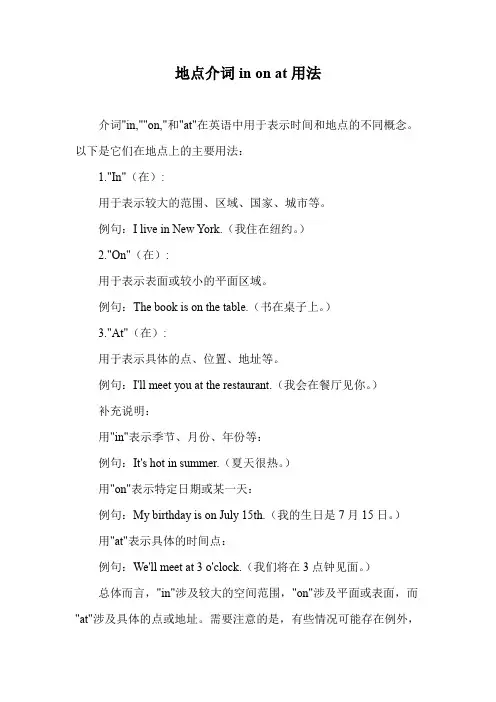
地点介词in on at用法
介词"in,""on,"和"at"在英语中用于表示时间和地点的不同概念。
以下是它们在地点上的主要用法:
1."In"(在):
用于表示较大的范围、区域、国家、城市等。
例句:I live in New York.(我住在纽约。
)
2."On"(在):
用于表示表面或较小的平面区域。
例句:The book is on the table.(书在桌子上。
)
3."At"(在):
用于表示具体的点、位置、地址等。
例句:I'll meet you at the restaurant.(我会在餐厅见你。
)
补充说明:
用"in"表示季节、月份、年份等:
例句:It's hot in summer.(夏天很热。
)
用"on"表示特定日期或某一天:
例句:My birthday is on July 15th.(我的生日是7月15日。
)
用"at"表示具体的时间点:
例句:We'll meet at 3 o'clock.(我们将在3点钟见面。
)
总体而言,"in"涉及较大的空间范围,"on"涉及平面或表面,而"at"涉及具体的点或地址。
需要注意的是,有些情况可能存在例外,
因此在具体语境中仍需谨慎使用。
初中英语介词in_on_at_的时间用法
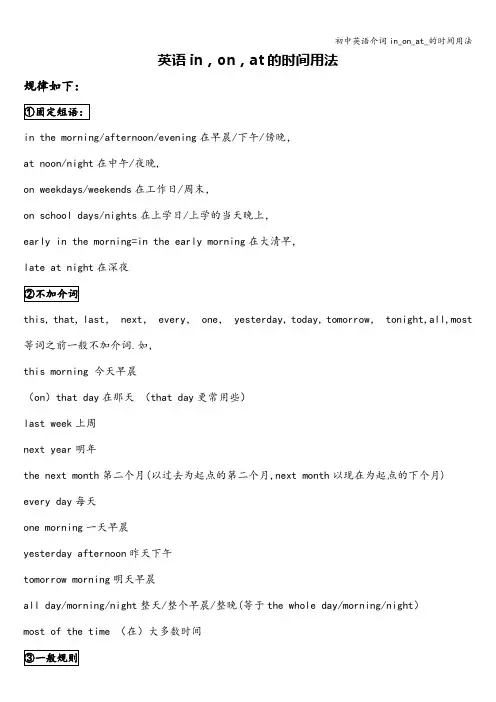
英语in,on,at的时间用法规律如下:in the morning/afternoon/evening在早晨/下午/傍晚,at noon/night在中午/夜晚,on weekdays/weekends在工作日/周末,on school days/nights在上学日/上学的当天晚上,early in the morning=in the early morning在大清早,late at night在深夜this, that, last, next, every, one, yesterday, today, tomorrow, tonight,all,most 等词之前一般不加介词.如,this morning 今天早晨(on)that day在那天(that day更常用些)last week上周next year明年the next month第二个月(以过去为起点的第二个月,next month以现在为起点的下个月) every day每天one morning一天早晨yesterday afternoon昨天下午tomorrow morning明天早晨all day/morning/night整天/整个早晨/整晚(等于the whole day/morning/night)most of the time (在)大多数时间除了前两点特殊用法之外,其他≤一天,用on,>一天用in,在具体时刻或在某时用at(不强调时间范围)关于onon my ninth birthday在我九岁生日那天on Teachers’Day在教师节(注意:节日里有表人的词汇一般都用复数在加s'所有格,如on Children’s Day,on Women’s Day, 有四个节日强调单数之意思,on Mother’s Day, on Father's Day,on April Fool’s Day,on Valentine’s Day)on Sunday在周日,on Sunday morning在周日早晨on June 2nd在六月二日on the second (of June 2nd) 在六月的第二天即在六月二日on the morning of June 2nd在六月二日的早晨,on a rainy morning在一个多雨的早晨注意:on Sunday在周日,on Sundays每逢周日(用复数表每逢之意),every Sunday每个周日,基本一个意思。
介词at和in,on的用法
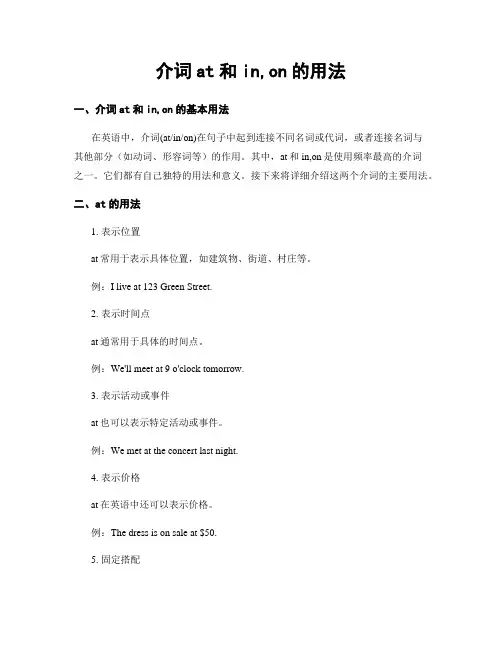
介词at和in,on的用法一、介词at和in,on的基本用法在英语中,介词(at/in/on)在句子中起到连接不同名词或代词,或者连接名词与其他部分(如动词、形容词等)的作用。
其中,at和in,on是使用频率最高的介词之一。
它们都有自己独特的用法和意义。
接下来将详细介绍这两个介词的主要用法。
二、at的用法1. 表示位置at常用于表示具体位置,如建筑物、街道、村庄等。
例:I live at 123 Green Street.2. 表示时间点at通常用于具体的时间点。
例:We'll meet at 9 o'clock tomorrow.3. 表示活动或事件at也可以表示特定活动或事件。
例:We met at the concert last night.4. 表示价格at在英语中还可以表示价格。
例:The dress is on sale at $50.5. 固定搭配at还与一些动宾结构固定搭配使用,如look at, laugh at等。
例:Don't laugh at others' mistakes.三、in的用法1. 表示位置范围in通常用于表示较大范围的位置,比如国家、城市等。
例:She lives in China.2. 表示月份/年份/季节等时间段in常用于具体的月份、年份、季节等时间段。
例:We'll go on vacation in July.3. 表示多久时间之内in也可以表示在一段时间内。
例:I can finish my work in two hours.4. 表示房间或建筑内部位置in还可以指室内的位置。
例:Please wait for me in the lobby.5. 与某些词固定搭配使用in和某些词组合使用时,有固定的搭配方式,如interested in, believe in等。
例:I'm interested in learning English.四、on的用法1. 表示接触面/表面位置on常用于描述平面接触面或表面位置。
in,on,at的时间用法
“in”、“on” 和“at” 在表示时间时的用法如下:
1. “in” 表示在一个时间范围或某个时间段内,如“in the morning”(早上)或“in 2023”(在2023年)。
2. “on” 用于表示在某一天或某一天的上午或下午,如“on Monday”(在星期一)或“on the afternoon of June 1st”(在6月1日下午)。
3. “at” 用于表示具体的时间点,如“at 6 o’clock”(在6点钟)或“at noon”(在中午)。
因此,要根据想要表达的具体时间来选择合适的介词。
如果是指某个时刻,那么一般使用“at”。
如果是表示某个特定的日期或者某个具体的上午或下午,则使用“on”。
而表示一个大概的时间段或在一个特定的日子里时,一般使用“in”。
介词in,at,on的用法 (2)
介词in,at,on的用法一、in, at, on的基本用法介词in,at,on是英语中常见的介词,它们在句子中起着连接名词或名词短语与其他成分的作用。
尽管它们看似简单,但其用法却有一些细微的差别,需要我们在使用时加以注意和区分。
I. in的用法1. 表示位于某处:in表示“在……里面”、“在……之中”,常用于指代较大的物体、空间或范围。
例如:- I am in the classroom.(我在教室里。
)- She is in France.(她在法国。
)2. 表示时间:in表示“在……时候”、“在……期间”,常用于表示年、季节、月份等。
例如:- We go swimming in summer.(夏天我们去游泳。
)- My birthday is in December.(我的生日是十二月份。
)3. 表示附加状态:in表示“处于某种状态”、“身处某种情况”,通常后面接复合结构。
例如:- He is in a bad mood today.(他今天心情不好。
)- The company is in financial trouble.(公司陷入了财务困境。
)II. at的用法1. 表示位置:at表示“在……地方”、“在某处”,常用于指代较小范围的地点、位置或具体场所。
例如:- She is waiting for you at the bus stop.(她在公交车站等你。
)- I will meet you at the cinema.(我会在电影院见你。
)2. 表示时间:at表示“在……具体时间点”,通常用于某一具体时刻、钟点或时间段。
例如:- The meeting starts at 9 a.m.(会议在上午九点开始。
)- I usually have dinner at 6:30 p.m.(我通常六点半吃晚饭。
)3. 表示动作进行的状态:at表示“正在进行某个动作”、“忙着做某事”,通常用于表示举止、动作进行中。
at on in 跟时间的用法
at on in 跟时间的用法
在表示时间的用法中,我们使用 at、on、in 来指示不同的时间概念。
下面是它们的用法:
1. "at" 表示具体的时间点或某个特定的时刻。
例如:
- I have a meeting at 9 o'clock.(我有一个会议在九点。
)- She usually goes to bed at midnight.(她通常在午夜睡觉。
)
2. "on" 主要用于日期、星期几和节日等特定的日子。
例如:
- My birthday is on August 10th.(我的生日是在8月10日。
)
- We always have a family gathering on Christmas Day.(我们总是在圣诞节这一天举行家庭聚会。
)
3. "in" 用于表示一个时间段、月份、季节或年份等。
例如:
- I will go on vacation in July.(我将在七月去度假。
)- The flowers bloom in spring.(花朵在春天开放。
)
- He was born in 1990.(他出生于1990年。
)
需要注意的是,具体使用哪个词取决于所表达的时间概念,因此在具体场景中,可能需要根据语境来确定使用哪个词。
介词on,in,at的用法及例句
介词on,in,at的用法及例句表示时间、地点的介词,最常用的是on、in、at,这三个介词,on、in、at这三个常用介词都可以表示时间和地点:on 具体指某一天,包括当天。
in泛指但不具体,范围比较大。
at指表示一个时间点。
介词on,in,at的用法及例句1on的用法1、表示时间“在(某一天,某天早上,某天前夕等)”。
on Monday 在星期一on October 1 在十月一日on Sunday morning 在星期日早晨on New Year's Eve 在除夕on the morning of May 1 在五月一日的早晨He went home on Monday last week.他在上星期一回家了。
2、表示位置“在...上”(与物体接触)There is a map of world on the wall.墙上有一幅世界地图3、表示“关于”(表示关系)。
We will have a talk on the history of the Party this afternoon.今天下午我们有关于党史的报告。
What about your idea on the subject?关于这个问题你有什么看法?4、引申意义,表示“从事...”“处于...情况中”。
They are on holiday.他们在度假。
2in的用法1、表示时间(年、月、季节、早晨、下午、晚间等) in 1976 在1976年in October 在十月in spring 在春天in the morning/afternoon/evening 在早上/下午/晚上I will come in a week.我一周后回来。
2、表示地点、场所。
The bullet wounded me in the leg.子弹打伤了我的腿。
3、表示“穿着、戴着(衣服、帽子等)”。
The girl in red is Li Ming's sister.穿红衣服的女孩是李明的妹妹。
- 1、下载文档前请自行甄别文档内容的完整性,平台不提供额外的编辑、内容补充、找答案等附加服务。
- 2、"仅部分预览"的文档,不可在线预览部分如存在完整性等问题,可反馈申请退款(可完整预览的文档不适用该条件!)。
- 3、如文档侵犯您的权益,请联系客服反馈,我们会尽快为您处理(人工客服工作时间:9:00-18:30)。
介词in on at 表示时间的用法及区别
Step1 Teaching Aims
教学生掌握时间介词in,on和at的区别及用法。
Step2 Teaching Key and Difficult Points
教学生掌握时间介词in,on和at的区别及用法。
Step3 Teaching Procedures
1.用in的场合后所接的都是较长时间
(1)表示“在某世纪/某年代/特定世纪某年代/年/季节/月”这个含义时,须用介词in
Eg: This machine was invented in the eighteenth century. 这台机器是在18世纪发明的。
、
She came to this city in 1980. 他于1980年来到这个城市。
It often rains here in summer. 夏天这里常常下雨。
(2)表示“从现在起一段时间以后”时,须用介词in。
(in+段时间表将来)
Eg: They will go to see you in a week. 他们将在一周后去看望你。
I will be back in a month. 我将在一个月后回来。
(3)泛指一般意义的上、下午、晚上用in, in the morning / evening / afternoon
Eg: They sometimes play games in the afternoon. 他们有时在下午做游戏。
Don't watch TV too much in the evening. 晚上看电视不要太多。
(4)A. 当morning, evening, afternoon被of短语修饰,习惯上应用on, 而不用in.
Eg: on the afternoon of August 1st
&
B. 但若前面的修饰词是early, late时,虽有of短语修饰,习惯上应用in, 而不用on.
Eg: in the early morning of September 10th 在9月10的清晨;
Early in the morning of National Day, I got up to catch the first bus to the zoo. 国庆节一清早,我便起床去赶到动物园的第一班公共汽车。
2.用on的场合后所接的时间多与日期有关
(1)表示“在具体的某一天”或(在具体的某一天的)早上、中午、晚上”,或“在某一天或某一天的上午,下午,晚上”等,须用介
词on。
Eg: Jack was born on May 10th, 1982. 杰克生于1982年5月10日。
They left on a rainy morning. 他们是在一个雨天的早上离开的。
He went back to America on a summer afternoon. 他于一个夏天的下午返回了美国。
(2)表示“在星期几”或“在星期几的早上、中午、晚上”等,须用介词on。
Eg: We don't go to school on Saturday and Sunday. 我们星期六和星期天不上学。
,
What time do you get up on weekdays 你在平日什么时候起床
I heard this story on Saturday morning. 我是在星期六的早晨听到这个故事的。
【温馨提示】“在周末”: at weekends, on weekends. “在工作日”是on weekdays on the weekend, at the weekend加了定冠词the, 是特指的那个周末,表示某个固定的周末;
on weekends, at weekends是一般性的每个周末。
(3)表示“在某一节假日、生日”时,须用介词on。
Eg: on my birthday
Mr Hu received a card on Teachers' Day. 胡老师在教师节那天收到了一张卡片。
We usually eat mooncakes on Mid-autumn Festival. 我们通常在中秋节吃月饼。
【温馨提示】at, on都可用来表示“节假日”,但at侧重指“休假的时节”,而不是指具体的哪一天;on侧重指具体的时日,与它连用的短语中多含“Day”at New Year(在新年期间)
at Christmas (在圣诞节期间) on New Year’s Day(在元旦那天) on Christmas Day (在圣诞节)
;
3.用at的场合后接的时间最短
(1)表示“某一具体时刻(即几点几分时)”时,用于钟点时刻前,须用介词at。
Eg: at ten o’clock, at a quarter to six
He gets up at six o'clock every day. 他每天六点起床。
I got home at five thirty yesterday afternoon. 我昨天下午五点半到家。
(2)用在特定的时候(时节、时机)时,须用介词at, 表示一瞬间
或短暂的时间
Eg: They were happy at that time. 他们那时很幸福。
I think the shop is clcsed at this time of day. 我认为商店在白天的这个时候关门了。
at that moment(在那一瞬间)at that time(那时)
(3)用于表示进餐时间。
{
Eg: at breakfast/lunch/supper (在早餐时/午餐时/晚餐时)
He drinks tea at breakfast. 他在早餐时饮茶。
(4)表示“在……岁”时,须用介词at。
Eg: At the age of nine ,the boy could swim well.在九岁的时候,这孩子就游泳游得很好了。
(5)表示“在中午、在夜晚、在周末”时,须用介词at。
Eg: at noon /night /midnight (半夜), at sunrise (日出时)
at dusk (黄昏), at dawn /daybreak (黎明)
What do you often do at noon 你中午经常做些什么
You can see many stars in the sky at night. 夜晚你能看到天空中有许多星星。
Step5 Homework
Write 5 sentences with in,on and at.。
